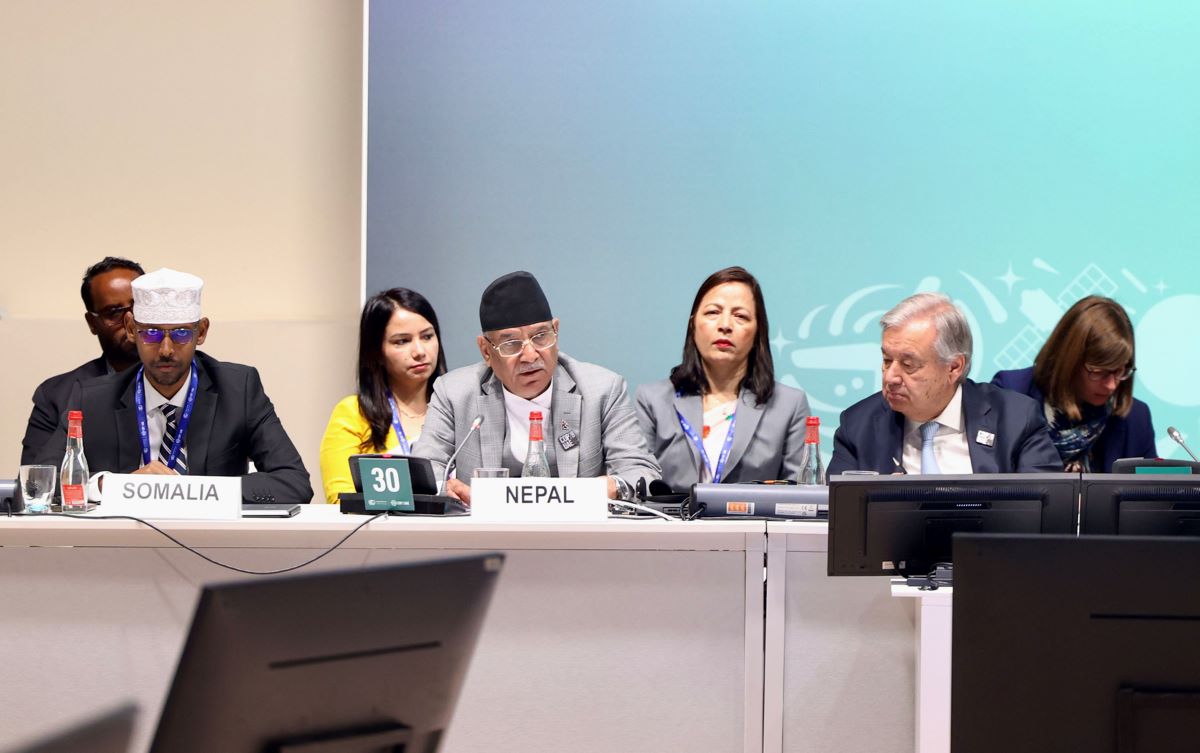KATHMANDU- Prime Minister Pushpa Kamal Dahal ‘Prachanda’ has said that despite contributing nearly zero to global carbon emissions, the LDCs are bearing the brunt of climate change, and they are on the frontline of this existential crisis, with highly unpredictable weather patterns, increased events of natural disasters, and environmental crises.
PM Dahal, also the Chair of LDCs, was addressing to the event “Delivering Early Warnings for All” organized on the margins of the COP 28 in Dubai today. “Due to such disasters, the LDCs face huge challenges in life and livelihoods resulting in livelihood disruptions, deaths, displacement, economic losses, and infrastructure damage. Over the years, human-induced climate change has caused extreme weather patterns leading to substantial damage to physical infrastructures and properties and financial losses,” he said.
Underlining that an early warning system is critical to save precious lives, prevent disruptions and displacement, and reduce economic losses and infrastructure damage, PM Dahal said the Doha Program of Action accords high priority for building resilience in LDCs by improving their early warning capacity to respond to shocks and vulnerabilities. “However, the LDCs are lacking resources and technological capacity. Therefore, I strongly urge the UN agencies and other development partners to scale up the resources for the LDCs,” the LDC Chair said.
The following is the full text of the statement by PM Dahal at the event:
H.E. Mr. António Guterres, Secretary-General of the United Nations Excellencies, Distinguished Delegates, Namaste and good morning. I am pleased to address this side event both on behalf of the group of the Least Developed Countries as well as in my national capacity. I thank the organizers for hosting this important event and providing me with this opportunity to draw global attention to reflect on the plight of LDCs on the Early Warnings for All (EW4ALL). I deeply commend the Secretary-General for spearheading the EW4ALL initiative which calls for every person to be protected by an early warning system by the end of 2027. I also appreciate the UN and other relevant agencies for their valuable work and support for this initiative.
Excellencies, Despite contributing nearly zero to global carbon emissions, the LDCs are bearing the brunt of climate change. They are on the frontline of this existential crisis, with highly unpredictable weather patterns, increased events of natural disasters, and environmental crises. Due to such disasters, they face huge challenges in life and livelihoods resulting in livelihood disruptions, deaths, displacement, economic losses, and infrastructure damage. One UNCTAD report revealed that 69 percent of worldwide deaths caused by climate-related disasters occurred in LDCs in the last five decades.
LDCs suffered 19% of the total number of climate, weather, and water-related hazards that accounted for 29% of the globally affected population between 2017 to 2021. On the contrary, the LDCs lack resources in terms of adaptation, mitigation, and adequate early warning systems to minimize the risks that impact the lives and livelihoods of our people. Over the years, human-induced climate change has caused extreme weather patterns leading to substantial damage to physical infrastructures and properties and financial losses. Against this backdrop, I underline that an early warning system is critical to save precious lives, prevent disruptions and displacement, and reduce economic losses and infrastructure damage. The Doha Program of Action accords high priority for building resilience in LDCs by improving their early warning capacity to respond to shocks and vulnerabilities.
However, the LDCs are lacking resources and technological capacity. Therefore, I strongly urge the UN agencies and other development partners to scale up the resources for the LDCs. Ladies and Gentlemen, Like other LDCs, Nepal is also highly vulnerable to disaster and climate change. We have been encountering a recurrence of soil erosion, landslides, flash floods, and droughts with increased intensity and impacts. Likewise, Nepal’s energy, agriculture, water resources, forestry, biodiversity, and health sectors are at high risk of climate change impacts. Therefore, the implementation of EW4ALL is critical in high-risk countries like Nepal where the disasters are intensifying, expanding, and getting more complex. Establishing a robust Early Warning System to address the risks of climate-induced disasters is the top priority of the Government.
I highly appreciate the UN Secretary-General for including Nepal in the list of this initiative which aligns with our national priorities. Nepal is committed to implementing the EW4ALL initiative of the Secretary-General which is instrumental in saving the lives of the most vulnerable people. Nepal’s National Disaster Risk Reduction and Management Authority has been working on the Multi-Hazard Early Warning System with a dedicated task group. The Authority is preparing a roadmap for the effective implementation of the EW4ALL initiative in collaboration with the UN agencies and development partners. I also request the development partners to extend their maximum support and coordination for this initiative.
Thank you for your kind attention.

